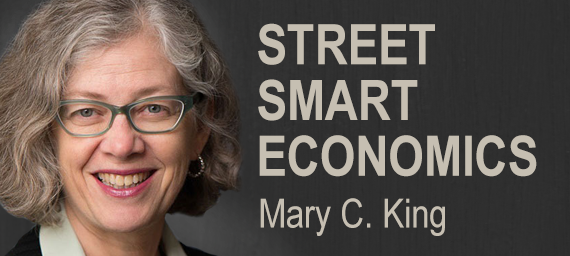In this U.S., the heaviest taxes fall on people with the least income, despite the insults you hear about so-called “makers and takers.” The 1% contribute less and less, though their “share” of national income has doubled in the last 40 years, from one-tenth to one-fifth. Due to under-reporting, assets hidden in tax havens, lack of enforcement, ever-bigger tax breaks and plunging tax rates at the top, billionaires now pay markedly less of their incomes in taxes than their assistants do. It hasn’t always been this way.
Tax rates are high at the bottom, lowest at the top
When you combine all federal, state and local taxes, you see that families with less than $15,000 a year pay more than a quarter of their income in payroll taxes, property taxes passed on to renters by landlords, income taxes and consumption taxes, including sales, gasoline, alcohol and tobacco taxes. Meanwhile, households with billions fork over less than a fifth of their income for all taxes combined, which doesn’t affect their lifestyle at all.
State and local taxes hit lower income families particularly hard. Oregon is better than many states, but the more people have, the smaller their contribution relative to their income to our schools, roads and other public services, as seen in this graphic created by the Oregon Center for Public Policy.
The graphic just shows taxes: It doesn’t include the Oregon lottery, which raised nearly a billion dollars in 2019. Lotteries take advantage of struggling households, which spend much more of their income on them than do people with more money. The affluent play the stock market, where the odds of coming out ahead are much better.
The earned income tax credit
Nearly half — 43% — of the audits conducted by the IRS are on families eligible for the Earned Income Tax Credit, or EITC. However, EITC recipients account for only 3% of unpaid tax revenue. Most people eligible for the tax credit have young children and incomes of less than $20,000 a year. The $2,000 or so credit they gain is one of the most effective elements of our weak anti-poverty efforts. Often, their error is simply claiming a child in the household of one parent rather than the other; it’s not that the family wasn’t entitled to the money.
One reason for the outrageous audit rate of EITC recipients is pressure from right-wing members of Congress. As Oregon Sen. Ron Wyden has said, “We have two tax systems in this country, and nothing illustrates that better than the IRS ignoring wealthy tax cheats while penalizing low-income workers over small mistakes.”
The upshot is that qualified, poor, working families who desperately need the money stop claiming the tax credit, having learned that challenging an audit is a difficult, time-consuming process that’s hard to win. Most of the lowest-income families don’t even try to appeal.
The rewards of ending tax evasion by the wealthy
The other reason the IRS focuses on low-income households — which are disproportionately families of color and single mothers — is that their tax returns are simple, easy to audit and corroborated by documents like W-2s from employers. Auditing the wealthy is a challenging proposition, with their complex tax returns, little supporting third-party documentation and armies of highly paid tax attorneys and accountants.
But the proportion of income that isn’t reported goes up fast as incomes rise. People with incomes over $10 million fail to report a proportion of their incomes more than five times as big as people with incomes under $200,000.
Congress, a millionaire’s club, has been slashing the IRS budget, so that it now has fewer revenue agents than it did in 1953, when the economy was one-seventh the size. Investing in the IRS’ ability to enforce the law would bring in an estimated $1.2 trillion to $1.4 trillion over the next 10 years. Nearly a third of that money, at least, would come from the 1%.
Excessive tax breaks, low rates and tax havens for corporations
Corporate tax revenues have shrunk dramatically due to lack of enforcement, excessive tax breaks and low tax rates. Many huge, profitable corporations pay no federal corporate income taxes at all. This year Nike got a big tax rebate of $109 million, despite profits of almost $2.9 billion in 2020. Phil Knight’s personal wealth hit $53 billion in February 2021.
Corporations used to pay half their profits straight to the government. If they paid dividends to their shareholders after that, or bonuses to their executives, those shareholders and execs paid personal income taxes on them, at a rate of 90%.
Corporate tax revenues have shriveled from one-fourteenth of national income to one-hundredth. That money now goes directly to the wealthy, because the ownership of big corporations is concentrated in their hands.
So, if you feel like you’re paying too much in taxes, you probably are! Unless you’re wealthy, in which case you owe the rest of us a lot of money. Think about that next time you hear any fussing about our new local taxes on high-income households to support services for the houseless or for universal preschool. We’re owed.
For more, I highly recommend a clearly written book by two top economists, Emmanuel Saez and Gabriel Zucman, “The Triumph of Injustice: How the Rich Dodge Taxes and How to Make Them Pay.”



